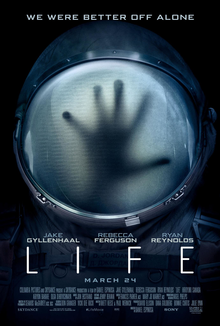There is no resuscitation for science fiction film

Science fiction movies have a special relationship with existential terror. The genre allows an artist to cover ground that invites a particular kind of fear. If it is a movie about space, then we are confronting a vast environment that suffocates human life instantly. If it is also about alien life, we are confronting the potential that another species might be superior or hostile — or both. That is the launching point for a lot of great science fiction movies.
“Life,” the new science fiction horror movie starring Ryan Reynolds and Jake Gyllenhall, understands that space and aliens are scary — it just does not understand much else. The movie centers around a crew on a space station studying a new form of life discovered on Mars. The entire movie takes place on the space station as the new form of life mutates into an indestructible monster. “Life” is made well enough. Tension escalates and the special effects are gruesome. However, the movie does not take any risks that allow it to transcend its counterparts in its genre.
“Life” is a regression from the original “Alien”— a movie released over 35 years ago. “Alien” might not seem as groundbreaking now as it did in 1979, but its atmosphere holds up. Not only does “Life” not achieve a unique atmosphere, but it does not even seem to make an effort. The space station that the crew finds themselves on is a wholly generic one. You could imagine a space movie about anything taking place on the ship. In a genre where so much of the novelty can come from the creation of new spaces, the standard setting of “Life” feels lazy.
The movie’s monster creation has a similar problem. It is the antithesis of what you would want to discover upon finding life on another planet. This new form of life kills people and grows from killing people, so it is scary, but not interesting on its own terms. The only problem it presents the crew with is the problem of avoiding and preventing death. “Life” lacks the imagination to create a monster that provokes compelling human drama.
“Prometheus,” the 2012 prequel to Alien, did a lot of work in expanding the mythology of the alien universe. It added a philosophical underpinning that seriously questioned the nature of life and intelligence. It also moved off of a spaceship and onto a new planet. The movie was mocked for its pseudoscience, but it had the right impulse in reaching for new ideas and a new location.
It is impossible to avoid comparing “Life” to other movies in its genre because it does so little to distinguish itself. The other films are more interesting to think about. This problem is built into its premise, and no amount of competent filmmaking or acting can overcome its sterile atmosphere and the simplicity of the set up.
Some may argue that the movie is redeemed by its ending, which ends up being the most inspired moment in the entire film. It goes all in on a sense of shock that few movies reach for. That feeling, though, does not reverberate throughout the movie. Surprising endings in great movies force you to reevaluate everything you have already seen. “Life’s” ending is a more sophisticated version of a hollow jump scare — surprising, but nothing more than a smart trick.







